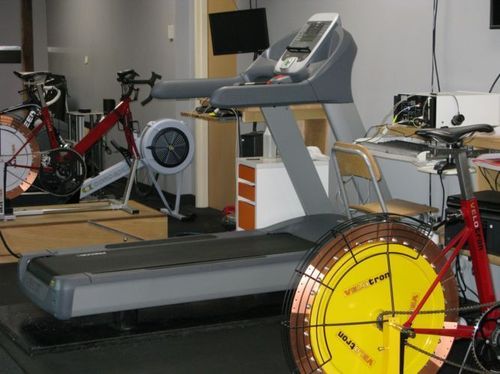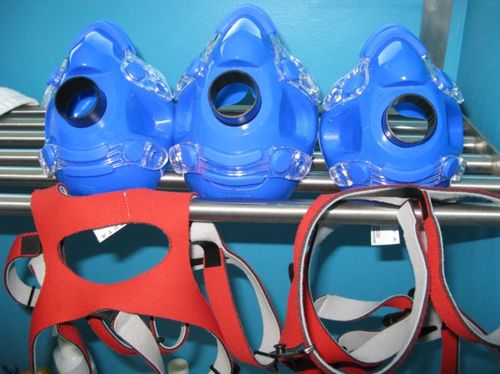It isn't that often that I have the opportunity to measure my diet and lifestyle changes with solid, thorough data. Most of the time, I simply deduce that an effort to eat less sugar, for instance, or more leafy greens, leaves me feeling subjectively "healthier."
So when Dr. Emily Cooper of Seattle Performance Medicine suggested I go through the full range of metabolic tests once again, I thought it would make for a very interesting comparison. I'd gone through her VO2 max and lactic threshold treadmill tests 15 months before in order to write about the experience for AOL's Patch news network. (Read the full article here.) At the time, I figured the experience would simply make a good story, and prove entertaining for an avid athlete like myself.
To my surprise, the tests indicated serious problems with my current exercise and diet regimen. Dr. Cooper found my heart rate, both resting and when running, was inappropriately low. The breathing mask worn on the treadmill indicated that at high intensities, my muscles used fat and protein for fuel, and relied less on carbohydrates. Since fueling with fat requires more oxygen than fueling with carbs, I wasn't exercising efficiently. In addition, when lying down at rest, the breath analysis showed that I was not burning much fat, indicating that my body felt it needed to conserve its stores. Clearly, my body was more stressed out and taxed than I'd believed.
At the time, Dr. Cooper hypothesized that my thyroid levels might be too low, and that I wasn't eating enough carbohydrates or timing my eating properly. Subsequent blood tests showed she was correct on both counts, and that my cortisol levels were also alarmingly high. For the latter condition, she suggested I try going off birth control pills, as the artificial hormones can cause cortisol levels to elevate.
Both of her medication recommendations resulted in immediate responses. A follow-up blood test showed my thyroid had rebounded to normal levels and my cortisol had plummeted. The eating component of her recommendations proved a bit more finicky, and took many more months of adjustments and tweaks.
The largest challenge, it seemed was fueling adequately for early morning rowing practices. I'd never been interested in food before 5 a.m., so I'd largely skipped pre-workout meals. After rowing, I'd eat a full breakfast, but typically after I'd put the boat away, driven home, and showered. Dr. Cooper told me that significant amounts of food both before and immediately after the workout were critical. Over the months, I gradually added more and more calories to the early morning routine.
Now that I'm accustomed to taking in large amounts of morning calories, I wake up hungry. I've been eating a full meal before crew (typically a sizable PB&J on two slices of Dave's Killer Bread) and a snack (a banana or something similar) as soon as I'm off the water. Breakfast immediately after usually includes carbs (two pieces of toast, for instance), a couple of eggs, and orange juice. A mid-morning snack might include yogurt, fruit, coffee, and a granola bar. For the rest of the day, I'm eating every couple of hours, and try not to let myself get so hungry that my blood sugar drops significantly.
It would seem like eating so much food all the time would cause one to pack on the pounds, but I haven't gained any weight. My body's metabolism simply responded by gearing up further. I'm burning through everything I eat in the morning, and I keep burning the rest of the day.
Subjectively, I knew that I felt better following the changes in diet, birth control, and thyroid medication. For the first time, I actually enjoyed 500-meter sprint bursts at crew practice. I wondered, though, if the results of the metabolic testing would support my perceived improvements.
As it turned out, the results indicated dramatic changes in strength and speed. On the incline treadmill test, I could run the same hill at a faster past while utilizing less oxygen. The flat treadmill test showed similar results, as I hit my aerobic threshold at a higher speed than one year prior, and managed to use significantly less oxygen while doing so.
"It's much easier for you to run harder," Dr. Cooper told me. "There's a major reduction in oxygen cost."
Other indicators pointed to improvements in my body's ability to work hard. My maximum heart rate climbed by eight beats per minutes. Before, I'd been burning excessive amounts of fat at my anaerobic threshhold, and the tests showed that I'm now burning carbs -- a much more efficient fuel source.
My resting metabolism, taken when lying down, showed that my caloric needs per day (if I wasn't moving at all) climbed from 1,740 kcal to 2,277. My protein-burning declined from 19 percent to 14.5 percent, and fat-burning at rest went from 0 percent to 58 percent. The results, Dr. Cooper said, indicated that my body now felt adequately fueled and was able to utilize fat reserves.
"Your body has the freedom to burn fat if it feels safe," Dr. Cooper said.
The most recent metabolic testing results position me well to make major athletic improvements, Dr. Cooper told me. Weaknesses still linger, however, as my heart rate still falls too quickly during recovery and I remain more efficient at running at a tempo pace than sprinting up hills. (Not surprising, as I've always preferred long rows or runs to sprints.) In my current state, I'd run a flat half marathon very well, Dr. Cooper said, but would struggle to be competitive at a hilly 10K. If I wanted to become a stronger athlete this year, she'd prescribe polarized training, alternating short, hard hill sprints with very easy running.
While I find the training advice interesting and useful down the road, my immediate goals aren't athletic. As I plan to start on the baby track in the not-so-distant future, I simply want to make sure my body feels balanced, healthy, and well fueled this year. I'll be entering a couple of half marathons this spring and summer, but I'm aiming to simply have fun, and not worry about hitting a PR.
Regardless of my sports ambitions, the results of the metabolic testing are important to me. The tests show me that I've made important changes in my diet and need to stay on the right track. I'd recommend the full range of metabolic tests to anyone who cares about athletic performance, or simply about their overall health.
For more by Heidi Dietrich, click here.
For more on personal health, click here.

